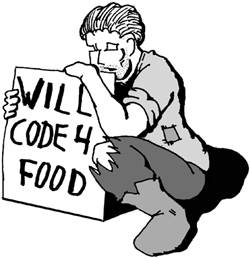![[Metroactive Features]](/features/gifs/feat468.gif)
[ Features Index | San Jose | Metroactive Central | Archives ]
The Other Valley
By Annalee Newitz
IT WAS ONE OF THOSE depressing evenings when the recent techno-economic bust felt like some sort of unstoppable force that would gradually corrupt every aspect of our social and emotional lives. Ed was lying on his bed, staring at the ceiling and talking about all the money that had been wasted on stupid ideas. He had a headache and the ibuprofen hadn't kicked in yet.
Jesse was playing on Ed's computer, occasionally making surprised noises. "How many partitions do you have on this thing?" he asked abruptly. I was sitting on the floor reading about proteonics in Wired. Ed continued to massage his temples and mutter about the demise of some company built by former Organic employees, and what had happened to his stock options, and something else about his keyboard.
"I think he has a bunch on there," I answered lamely, thinking about partitions. "Linux is on one for sure, and maybe, um, NT?" Jesse folded his arms. I could tell he was wondering why Ed didn't have OpenBSD, but he didn't say anything out of respect for Ed's headache.
"Websites shouldn't cost millions of dollars to make," Ed groaned. "It wasn't supposed to be this way. Think of all those good ideas that went to waste because people were spending money on stupid things. Now everybody has been bought or they've gone out of business." He eyed me blearily.
"Did you know that they're mapping proteins now?" I asked in a let's-think-happy-tech-thoughts voice, trying to change the subject. "There are all these startups doing biotech." Then I launched into a long, ill-advised exegesis on how I thought that the open source movement's next stage would be to challenge all the patenting in the world of biotech. "I want my genes and proteins to be open source," I concluded grandly. Now Ed was seriously annoyed.
"A gene is not like a computer program," he said sourly. I decided not to debate the point. Jesse had just eaten three of Ed's caffeine mints and was getting seriously bouncy. "C'mon, c'mon," he said, "let's watch a movie!" I had just the ticket--a new documentary from Alan Snitow and Deborah Kaufman called Secrets of Silicon Valley. It was supposed to be about the dark side of technological progress, the impoverished people whose underpaid labor created the wealth of Silicon Valley. The whole premise reminded me of that Michael Harrington book The Other America, published back in the 1960s, which served as a reminder that, despite America's postwar affluence, hundreds of thousands of people still lived in abject poverty.
What was strange about watching Snitow and Kaufman's finely conceived film--which makes much of the stark contrast between ghettoized East Palo Alto and its lush corporate neighbors on Sand Hill Road (the venture capitalists' version of Wall Street)--was that it had been made before the techno-crash of late 2000. We experienced a weird sort of nostalgia watching all the creepy excess of Sandhill Road, its corporate events featuring hobby cars built for $200,000 and people riding on rented camels.
Secrets of Silicon Valley also reveals the part of the valley that is now, post-crash, becoming more and more visible. From the point of view of middle-class types, this is the "other" valley. It's a place where jobs are scarce and grueling, and several families live packed into houses built for two or three people. Workers at massive temp agency Manpower Inc. are being ergonomically and economically destroyed on assembly lines, packing hundreds of HP printers into boxes every day.
Activist Raj Jayadev, who took a job at Manpower to help organize temp workers, looks calmly into the camera and says, "Think about where your printer has been. Think about all the hands it has passed through, the machines, the assembly lines." Tech does not miraculously appear out of thin air on the aisles of Fry's or Circuit City. It comes from people.
Watching the familiar scenes of low-income housing being destroyed for high-income offices, I thought to myself: think of where our culture has been for the last five years. Think of all the money and all the jobs lost.
And look at us now: the office buildings are empty; the astronomically expensive websites are going out of date; the once-eager techies are living on noodles in their parents' apartments. What could we have done differently to prevent this? Perhaps we could have started by realizing that the other valley isn't so "other" after all.
[ San Jose | Metroactive Central | Archives ]
Copyright © 2001 Metro Publishing Inc. Metroactive is affiliated with the Boulevards Network.
For more information about the San Jose/Silicon Valley area, visit sanjose.com.
![]()

Illustration by Jeremy Russell
Annalee Newitz ([email protected]) is a surly media nerd who owns no stock, no companies and no real estate. 'Secrets of Silicon Valley' plays April 5-11 at Fine Arts Cinema in Berkeley, April 18 at Rafael Film Center in San Rafael, and April 24-26 at the Towne Theatre in San Jose.
From the March 29-April 4, 2001 issue of Metro, Silicon Valley's Weekly Newspaper.